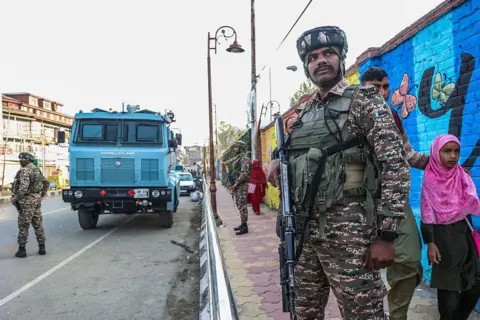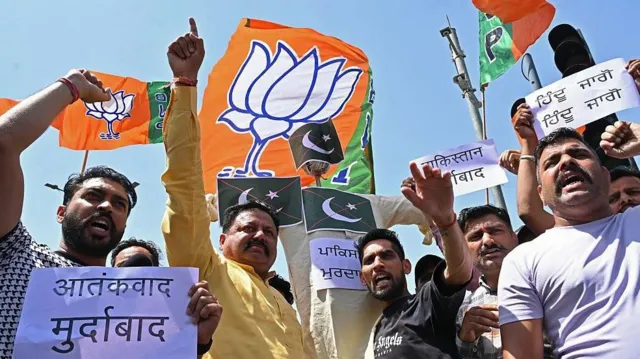Tuesday's bloodshed in Pahalgam - where at least 26 tourists were killed in a hail of gunfire - marks the deadliest militant attack in Kashmir since 2019.
The victims weren't soldiers or officials, but civilians on holiday in one of India's most picturesque valleys. That alone makes this strike both brutal and symbolic: a calculated assault not just on lives, but on a fragile sense of normalcy the Indian state has worked hard to project in the disputed region.
Given the fraught history of Kashmir - claimed in full by both India and Pakistan but ruled by each only in part - India's response is likely to be shaped as much by precedent as by pressure, say experts.
For starters, Delhi has swiftly taken a series of retaliatory steps: closing the main border crossing, suspending a critical water-sharing treaty, and expelling diplomats.
More significantly, Defence Minister Rajnath Singh has vowed a "strong response," pledging action not just against the perpetrators but also the masterminds behind the "nefarious acts" on Indian soil.
The question, analysts say, is not whether there will be a military response - but when, and how calibrated it will be, and at what cost.
"We are likely to see a strong response – one that signals resolve to both domestic audiences and actors in Pakistan. Since 2016 and especially after 2019, the threshold for retaliation has been set at cross-border or air strikes," military historian Srinath Raghavan told the BBC.
"It'll be hard for the government to act below that now. Pakistan will likely respond, as it did before. The risk, as always, is miscalculation – on both sides."
Mr Raghavan is alluding to two previous major retaliations by India in 2016 and 2019.
After the deadly Uri attack in September 2016, where 19 Indian soldiers were killed, India launched what it called "surgical strikes" across the de facto border - also known as the Line of Control (LoC) - targeting what it said were militant launch pads in Pakistan-administered Kashmir.
And in 2019, after at least 40 paramilitary personnel were killed in Pulwama, India hit an alleged militant camp in Balakot with airstrikes - its first such strike deep inside Pakistan since 1971. Pakistan responded with air raids, leading to a dogfight and the brief capture of an Indian pilot. Both sides showed strength but avoided full-scale war.
Two years later, in 2021, they agreed to an LoC ceasefire, which has largely held - despite recurring militant attacks in Indian-administered Kashmir.
Michael Kugelman, a foreign policy analyst, believes that the combination of high fatality levels and the targeting of Indian civilians in the latest attack "suggests a strong possibility of an Indian military response against Pakistan, if Delhi determines or merely assumes any level of Pakistani complicity".
 Getty Images
Getty ImagesMr Kugelman says that one of the lessons of the Pulwama crisis is that "each country is comfortable using limited counter retaliation".
"India will need to weigh the political and tactical advantages of retaliation with the risk of a serious crisis or conflict."
Hussain Haqqani, a former Pakistani ambassador to the US, believes escalation is possible this time, with India likely to consider limited "surgical strikes" like in 2016.
"The advantage of such strikes from India's point of view is they are limited in scope, so Pakistan does not have to respond, and yet they demonstrate to the Indian public that India has acted," Mr Haqqani, a senior fellow at Anwar Gargash Diplomatic Academy and Hudson Institute, told the BBC.
"But such strikes can also invite retaliation from Pakistan, which argues that it is being blamed in a knee jerk reaction, without any investigation or evidence."
Whatever course India chooses - and however Pakistan responds - each step is fraught with risk. The threat of escalation looms, and with it, the fragile peace in Kashmir slips further out of reach.
At the same time, India must reckon with the security failures that allowed the attack to happen in the first place. "That such an attack occurred at the peak of tourist season," Mr Raghavan noted, "points to a serious lapse - especially in a Union Territory where the federal government directly controls law and order."

Post a Comment